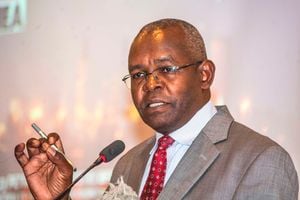Developing story: Iranian President Ebrahim Raisi confirmed dead in chopper crash

A close-up picture of a stack of 100-dollar bills. PHOTO | SHUTTERSTOCK
Kenya will not pay the first instalment of its $2.0 billion (Sh309.9 billion) Eurobond loan in advance this month, as earlier planned, with the government now awaiting advice from the lead arrangers on a new date next year.
This marks a U-turn from the hard stop of December 31, 2023 for a $300 million (Sh46.5 billion) buyback that was announced by President William Ruto during the State of the Nation Address on November 9.
The President sought to reassure jittery investors that Kenya was ready and capable of settling the Eurobond loan when it matures in June 2024.
But the director-general in charge of Public Debt Management at the Treasury, Dr Haron Sirima, told the Business Daily last week that whereas the government was working towards a buyback, the time of doing so would be solely guided by advice received from the lead arrangers, CitiBank and Standard Bank, on the suitability of market conditions.
“The government is committed to completing the redemption of the bonds set to mature in June, 2024. Indeed, the government had earlier planned to undertake the buyback before the end of December 2023. The decision as to when to access the market shall be guided by the government-appointed joint lead managers and legal counsel based on market conditions,” Dr Sirima told the Business Daily.
“The government is currently working towards conducting a buyback of a portion of the 2024s subject to market conditions and completion of satisfactory documentation.”
A bond buyback allows the issuer, in this case Kenya, to retire its outstanding debt, either in part or whole, before the maturity date through cash payment.
Buybacks are often undertaken in an environment where refinancing has posed challenges, implying an issuer’s ability to issue fresh debt to retire the maturing one has encountered headwinds in the global markets.
“We have worked hard to mobilise a broad coalition of bilateral development partners, multilateral development banks and other agencies which have rallied to pull our country back from the brink of debt distress,” President William Ruto stated during the November 9 State of the Nation Address.
“Our efforts to stabilise the situation have yielded such progress that next month, in December, we will be able to settle the first $300.0 million instalment of the $2.0 billion Eurobond debt that falls due next year.”
In the recent past, many African economies, Kenya included, have faced challenges refinancing following the raising of monetary policy rates by major central banks globally, a move which has triggered the outflow of foreign currency from the continent back to perceived safer havens.
In an earlier interview with the Business Daily, Central Bank of Kenya (CBK) Governor Kamau Thugge said the government was banking on a disbursement from the Trade and Development Bank (TDB) to be able to undertake the $300 million buyback.
“We do expect some external inflows between now and the end of December and broadly we do expect a financial account surplus of just slightly over the current account,” Dr Thugge said.
“So, in other words, there are enough financial inflows to cover the current account deficit and have a surplus of around $561.0 million but that is assuming that we get the full amount of $500.0 million from TDB (Trade & Development Bank). That full amount may not come in, the latest information we have is that we may only get $300 million within the first two weeks of December.”
Ethiopia became the third African country after Zambia and Ghana to default after it failed to make a $33 million "coupon" payment on its only international government bond.
Ethiopia, which is Africa's second most populous country, announced earlier this month that it would formally go into default, having been under severe financial strain in the wake of the Covid-19 pandemic and a two-year civil war that ended in November 2022.
The global financial markets are keenly following Kenya’s plans around the settlement of its $2.0 billion Eurobond.
Kenya has leaned towards cheap credit from multilateral institutions, the International Monetary Fund (IMF) and the World Bank, to be able to settle the maturing debt.
On November 16, the IMF increased the size of Kenya’s ongoing programme by $938.0 million (Sh145.4 billion) following the conclusion of the sixth review.
Exchange rate: $1.0 = Sh154.96







